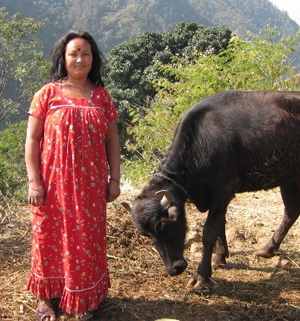Nepal
Nepal is mostly known for its magnificent mountain tops, places of pilgrimage, renowned temples and extraordinary hospitality. However, this country also has a dark side. Nepal is the poorest country in Southeast Asia and comes twelfth on the list of poorest countries in the world. Moreover, Nepal is one of the few countries in which female life expectancy is lower than male life expectancy. Due to limited access to healthcare and finances, the situation of women in rural areas is especially harrowing. Together with our local partner, we are changing this situation.
Meet Lali
This is Lali (33) from Nepal. She is married and has four children. After using the loan to buy a buffalo, she started selling its milk, which is used in Chai, a popular tea. Now that her income has gone up, she can send her children to school.

The Dhulikhel Hospital is located in the city of the same name in the province of Kavre, 30 kilometers northeast of Kathmandu. As hospitals with modern facilities remain inaccessible to the majority of the population, Dhulikhel has started an outreach program. Twelve different health care centres across the country’s regions continuously offer health care to people from all levels of the population. Moreover, these centres are also used as information, prevention and rehabilitation centres.
In cooperation with Microcredits for Mothers, the outreach post Kattike Deurali Health Centre Kavre has been providing loans to groups of women formed specifically for this purpose since August 2009.
Community Self-Reliance Centre (CSRC), a local development organization in Nepal, is taking care of very poor farmer communities without land in rural areas. Families in these communities have no access to land due to their social background and because of this, they live in great poverty. CSRC mobilizes these families to stand up for their rights so they are able to built an independant livelihood. Meanwhile thousands of families gain access to farmland this way. To reach their goals and mission, CSRC started in 2012 with setting up co-operations for these families and start with a saving system for all participants. The savings can be used for intern loans, f.e. for incidental costs. However the amount of savings is too low for loans with an investment purpose and therefor the families stay dependent from expensive informal loans.